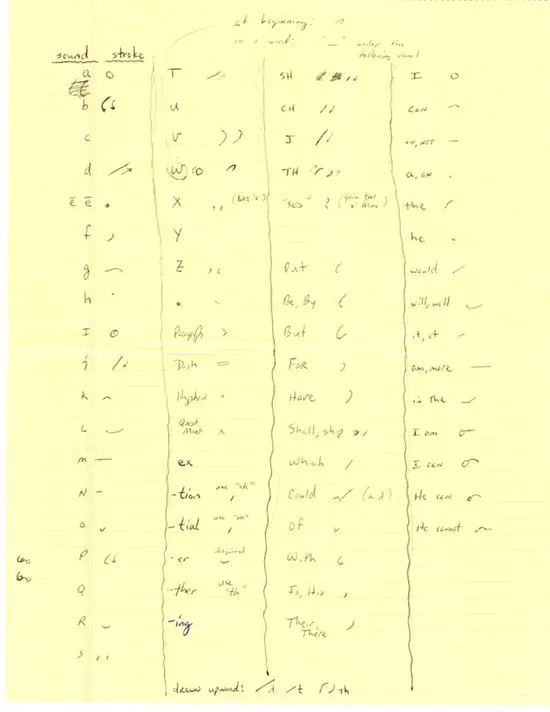In the name of being more productive I try a lot of different things, so I started teaching myself shorthand recently, Gregg Shorthand, to be specific. Yes, shorthand is an obscure technology these days, but I thought it might help me take notes faster at meetings in my work as a business analyst. Personally I’ve had mixed results, but if you have a curious mind and wonder how things work, then learning shorthand might be interesting to you too.
Here’s the first group of good links I’ve found related to the topic of learning shorthand:
I’m really struggling to find any other good links here ... not surprising I guess.
“Gregg Shorthand” book
As an update, I decided to take this a step further and purchased a copy of the Gregg Shorthand Manual Simplified from Amazon for just $7.25. It hasn’t arrived yet, but I look forward to it. I’ve already started writing a lot of shorthand notes using the 31 sample pages from Amazon as a reference, but they left a few key sounds out of their free pages, so I can’t write too many complete words yet.
The Gregg system is kind of cool because it’s different, and it forces you to think about sounds (phonetics) as opposed to words and spelling. This is a little different for a slightly older human mind, and a nice stretch of the brain muscles. (Different ways of thinking like this are intriguing to me.)
My Gregg Shorthand cheat sheet
Update: It’s much later now, and after many requests I finally dug through some old boxes and found the page of Gregg Shorthand symbols (a Gregg Shorthand cheat sheet, or reference) that I created several years ago. (Since I no longer work as a business analyst, I don’t use Gregg Shorthand any more.)
Here’s a small image of my Gregg Shorthand cheat sheet:
Just click through that small image to see a much larger image.
On this cheat sheet, I put the phonetic sound of each symbol in the left column, and the Gregg Shorthand symbol on the right side of each column.
Common shorthand symbols and phrases
As you can see from the last column in that image, you can write some common phrases very fast. To write something like “I will” in Gregg shorthand, just write the “I” symbol and then the “will” symbol.
I found that even just learning a small core group of shorthand symbols let me take notes faster. The next time you’re in a meeting, think about the words you here most often, and you’ll see that words like “the”, “he”, “she”, “will”, “would”, “could” are all very popular. When you’re taking notes in meetings with several other people, you’ll find that you need to note people’s names a lot, so I created my own shorthand symbols for those, typically some variation of their initials.
Terms specific to your business are also popular, so again I recommend creating your own shorthand symbols for those. For instance, I worked as a business analyst on a large project for a printing company, and came up with shorthand versions of words like customer, issue, magazine, gatefold, barndoor, CSR, DSR, and many other words that are specific to their business.




